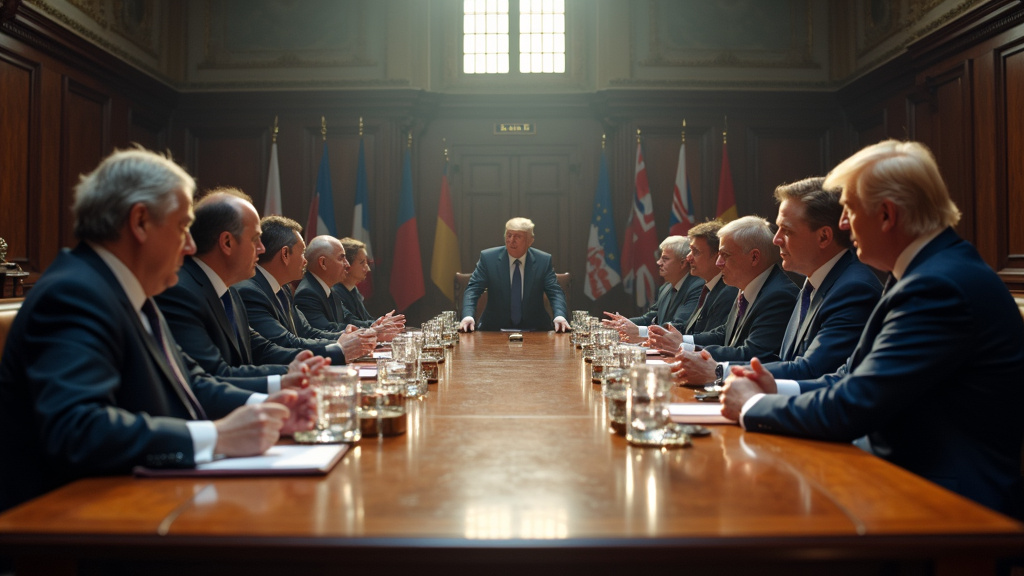President Donald Trump has concluded a significant state visit to the United Kingdom, marked by substantial U.S. investment pledges in British technology, even as critical diplomatic maneuvers unfolded concurrently. A highly anticipated call between President Trump and Chinese President Xi Jinping was scheduled for Friday, September 19, 2025, aimed at finalizing a framework agreement for the popular social media app TikTok to continue operating in the United States, a development that could potentially ease U.S.-China gridlock.
Navigating the TikTok Gridlock
Discussions between Washington and Beijing have reached a pivotal stage regarding TikTok’s future in the U.S. Following trade talks in Madrid, U.S. Treasury Secretary Scott Bessent announced that a framework agreement had been established for TikTok’s ownership, with President Trump and President Xi expected to discuss and potentially finalize the accord. The core of the agreement seeks to address U.S. national security and data privacy concerns, which have long centered on the app’s Chinese parent company, ByteDance, and the potential for Beijing to access American user data or influence content via its algorithm. Under the proposed structure, a significant portion of TikTok’s U.S. operations would transition to American ownership, reportedly involving a consortium of U.S. investors such as Oracle, Andreessen Horowitz, and Silver Lake, with ByteDance retaining a minority stake. This ongoing negotiation is seen as a crucial moment in U.S.-China tech diplomacy and a potential step toward de-escalating broader trade tensions between the two global economic powers. The current situation reflects a complex geopolitical landscape where technological assets are central to international relations.
A “Tech Prosperity Deal” in the UK
President Trump’s return to Washington follows his second state visit to the UK, a trip that underscored the enduring “special relationship” and yielded significant economic outcomes. During the visit, President Trump and British Prime Minister Keir Starmer signed a landmark “Tech Prosperity Deal,” announcing over $200 billion (approximately £150 billion) in U.S. investment into the United Kingdom. This historic agreement, hailed as the largest of its kind in British history, involves major U.S. tech firms like Nvidia, OpenAI, Google, and Salesforce, with commitments to invest in areas such as artificial intelligence (AI), quantum computing, 6G technology, and civil nuclear energy. The initiative aims to foster innovation, create thousands of jobs in both nations, and strengthen transatlantic economic ties. Prime Minister Starmer described the pact as a blueprint for winning the “new era together,” emphasizing shared values and opportunities.
Diplomatic Nuances and Divergences
While the U.K. visit was characterized by expressions of strong partnership and substantial economic agreements, underlying diplomatic divergences were also apparent. President Trump and Prime Minister Starmer engaged in discussions that, according to reports, saw subtle disagreements on key foreign policy issues. Notably, President Trump expressed his opposition to the U.K.’s anticipated recognition of a Palestinian state, a stance that contrasted with the British government’s position, which indicated readiness to recognize a Palestinian state if Israel failed to advance peace and alleviate suffering in Gaza. Furthermore, discussions touched upon approaches to Russian President Vladimir Putin, with Trump stating that Putin had “let him down” and expressing frustration over European nations’ continued purchase of Russian oil. Despite these differences, the leaders largely presented a united front, emphasizing cooperation and downplaying potential rifts during joint press conferences.
A Trending Period for Global Affairs
This period represents a dynamic phase in international relations, with significant developments in both U.S.-China trade negotiations and transatlantic partnerships. The ongoing efforts to resolve the TikTok dispute highlight the complex interplay between national security interests, economic interdependence, and technological influence in the current global landscape. Simultaneously, the robust U.S. investment in the U.K.’s tech sector underscores a strategic alignment aimed at fostering innovation and economic growth. As these high-stakes discussions and diplomatic engagements unfold, they are shaping trending narratives in global news and providing insights into the evolving dynamics of international commerce and foreign policy. The outcome of the TikTok negotiations and the sustained U.S.-U.K. economic cooperation will likely have far-reaching implications for future global trade and digital governance.
Conclusion
The recent events underscore a period of intense diplomatic activity for President Trump, marked by both strategic breakthroughs and the management of complex international relationships. The potential resolution of the TikTok saga offers a path to de-escalate U.S.-China tensions, while the “Tech Prosperity Deal” with the U.K. signals a strong commitment to technological collaboration. As these developments continue to unfold, they underscore the critical role of diplomacy and economic partnership in navigating the challenges and opportunities of the current global era.














